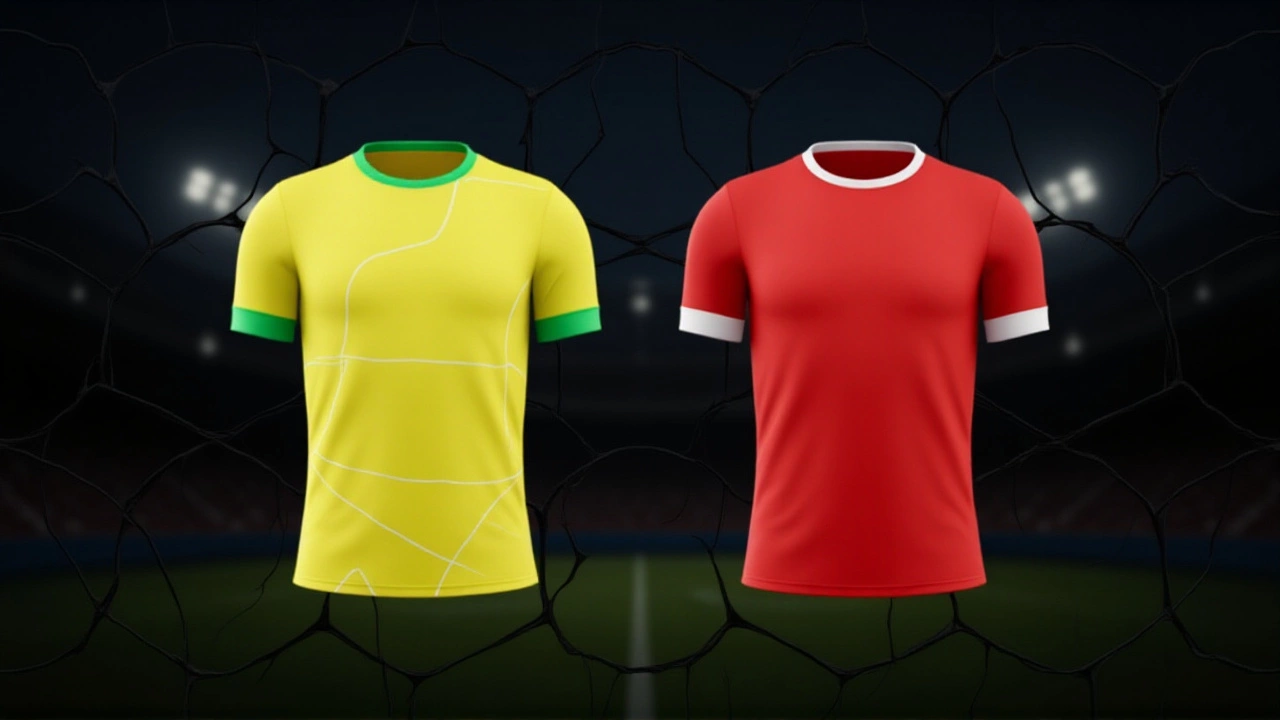Brazil and Tunisia Draw 1-1 in Lille Friendly as Estêvão Willian Equalizes from Penalty

It wasn't supposed to be this close. Brazil, the five-time World Cup champions, entered the pitch at Stade Pierre-Mauroy in Lille as overwhelming favorites. But Tunisia had other ideas — and on a damp Tuesday night, November 18, 2025, they stunned the Seleção with a goal that echoed through the stands and left the Brazilian bench speechless. The final whistle blew at 90'+5' with the score locked at 1-1, a result that said more about resilience than rankings. Attendance? 47,500 — a near-capacity crowd that got more than just a friendly. They got drama.
A Surprise in the 23rd Minute
It came out of nowhere. Tunisia, often seen as underdogs in global friendlies, broke forward with terrifying speed. Ali Abdi threaded a pass through Brazil’s high defensive line, catching Marquinhos flat-footed. Hazem Mastouri arrived like a runner on a track, took one touch to set himself, and fired a right-footed shot low and hard into the center of the net. No fluke. No deflection. Just pure, clinical finishing. The Tunisian bench exploded. The Brazilian defense froze. And for the first time in nearly 18 months, Brazil conceded first in an international friendly.Estêvão Willian’s Moment
Brazil responded the way they always do — with pressure, possession, and plenty of noise. But noise doesn’t score goals. Precision does. And in the 44th minute, with the first half winding down, they got it. A handball by Ederson (Tunisia) in the box, after a wild scramble following a Vinícius Júnior cross, gave Brazil a penalty. Up stepped Estêvão Willian, the 19-year-old forward from São Paulo who’s been quietly climbing Brazil’s youth ranks. No hesitation. Left foot. Top right corner. Aymen Dahmen guessed right — but the ball was too perfect. The equalizer wasn’t just a goal; it was a statement. The kid doesn’t flinch.Possession vs. Precision
The numbers told one story: Brazil had 68% possession. They took 18 shots — seven on target. Tunisia had 32% possession. Five shots. Two on target. One goal. That’s not a fluke. That’s efficiency. Rodrygo had three clear chances blocked or saved — one by Aymen Dahmen in the 39th minute, a fingertip save that looked like something from a highlight reel. Another from Estêvão, a curling left-footed effort from 25 yards, smothered by Dahmen again. Even Vinícius Júnior, Brazil’s sparkplug, was neutralized by tight marking and a disciplined Tunisian midfield.Meanwhile, Tunisia didn’t just sit back. They countered. Twice in the first half, they had clear one-on-one opportunities. Ismaël Gharbi missed a wide left-footed shot from outside the box — but it was the intent that mattered. They believed they could hurt Brazil. And they did.
The Near-Miss That Could Have Changed Everything
The match didn’t end with the final whistle. It ended with a heart-stopping moment in the 90'+5'. Estêvão Willian, now buzzing with confidence, cut inside from the right flank, danced past two defenders, and unleashed a right-footed strike from the edge of the six-yard box. The ball slammed into the left post. The crowd gasped. The Tunisian keeper dropped to his knees. Brazil’s substitutes stood frozen. It was the closest either side came to a winner — and it came from the same player who had equalized."It’s not about possession," said Tunisian head coach Jalel Kadri after the match. "It’s about belief. We trained for this moment. We knew Brazil would dominate. We knew we had to be clinical. We were. That’s football."

What This Means for Both Teams
For Brazil, this was a wake-up call disguised as a friendly. The squad is blending youth and experience — Estêvão Willian, 19, and Fabinho, 28, played together. Casemiro, 33, was a calming presence. But the lack of cutting edge in the final third? That’s a problem. Rodrygo looked off. Matheus Cunha was isolated. Vinícius was marked out of the game. The next six months, leading into the 2026 World Cup qualifiers, will test whether this new generation can deliver under pressure — not just in training, but in the heat of a packed Maracanã.For Tunisia, it’s validation. They’ve been rebuilding since their 2022 World Cup run. This draw against Brazil — a team that’s won 12 of their last 13 friendlies — proves they’re not just a regional force. They’re a threat. Dahmen, 23, was outstanding. Mastouri, 26, showed he’s still the man for big moments. And Abdi? He’s becoming the engine of their attack. With Africa Cup of Nations qualifiers starting in January 2026, this result gives them a psychological edge over rivals who might have underestimated them.
What’s Next?
Brazil returns home to face Chile in a high-stakes friendly on December 10 in São Paulo — a dress rehearsal for their opening World Cup qualifier against Peru in March. Tunisia heads to Tunis for a training camp ahead of their first AFCON qualifier against Mali on January 12, 2026. Both teams will watch this match tape closely. Brazil will study how to break down compact defenses. Tunisia will study how to keep it.Frequently Asked Questions
Why did Brazil lose possession but still dominate the game?
Brazil controlled the ball for nearly 70% of the match, but Tunisia’s compact 5-4-1 shape and disciplined pressing limited Brazil’s penetration. The Seleção kept passing sideways or backward under pressure, failing to create clear-cut chances despite having 18 shots. It’s a classic case of possession without purpose — a growing concern as Brazil prepares for tougher opponents in 2026 World Cup qualifiers.
How significant is Estêvão Willian’s performance for Brazil’s future?
Estêvão Willian’s penalty goal and near-post strike mark him as Brazil’s most promising emerging talent since Endrick. At just 19, he’s calm under pressure and clinically finishes chances — a rare trait in Brazil’s current crop of forwards. If he maintains this form, he could start alongside Vinícius and Rodrygo in the 2026 World Cup. His rise also eases concerns about the aging of Neymar and the inconsistency of Richarlison.
What does this draw mean for Tunisia’s World Cup qualification chances?
This result sends a strong message: Tunisia can compete with elite teams. Their defensive organization and counter-attacking efficiency, demonstrated against Brazil, could be decisive in a tough African qualifying group that includes Senegal and Egypt. If they replicate this performance in home qualifiers, they’re firmly in contention for one of Africa’s four direct World Cup spots in 2026.
Why was Aymen Dahmen so effective despite Brazil’s pressure?
Dahmen, 23, has developed into one of Africa’s most reliable goalkeepers. His positioning, quick reflexes, and composure under high crosses were on full display. He made five saves — including two spectacular stops from Rodrygo and Estêvão — and even cleared a dangerous rebound with his feet in the 78th minute. His performance earned him Man of the Match honors, a rare feat for a Tunisian keeper against Brazil.
Was the penalty decision controversial?
No — VAR confirmed it clearly. Ederson’s arm made contact with Vinícius Júnior’s cross in the box, and the referee pointed to the spot immediately. Tunisia’s protests were brief. The replay showed the ball struck his raised arm from close range, making it a clear handball under IFAB rules. The decision was correct, and Brazil capitalized on it with precision.
Where does this match rank in Brazil-Tunisia history?
This was only their third meeting ever. Brazil won 3-0 in 2005 and 2-1 in 2013. A 1-1 draw in 2025 is Tunisia’s best result against Brazil to date — and one of their most significant international results since their 2004 Africa Cup of Nations win. It signals a shift: smaller nations are no longer just cannon fodder for giants.